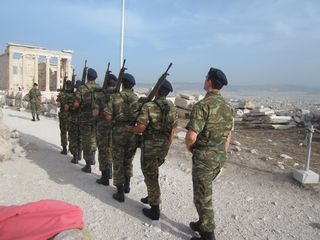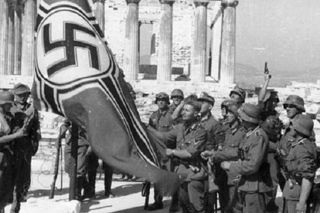Soldiers (and flags) on the Acropolis
I realise that it ill behoves anyone who is a citizen of a nation that still hosts Trooping the Colour even to appear to be a little bit critical of any other country's military displays. But a few days ago I was on the Acropolis in Athens and witnessed what was a slightly startling performance. A small party of soldiers marched across the site to the far East end, to raise the Greek flag from the flagpole and sing the national anthem (most of these soldiers looked like the newest recruits on national service -- not a single one, included the 'commanding officer', looked a day over 20). That's them above, and you can also see in the picture the progress of the restoration of the Parthenon.
OK, if you have a flag there, then someone has to hoist it. And if you still have compulsory National Service (preparing to fight whom?), then this is a fairly benign way of deploying some raw recruits. All the same, there was something decidedly disconcerting about seeing this little militaristic display at a place that is certainly a national monument but also an archaeological site. OK, I suppose there is sometimes quite a big RAF presence at Stonehenge . . . perhaps I just haven't seen it, or been there earlier enough in the morning.
But there is a back story to flags on the Acropolis, which makes a bit of a difference.
In 1941 Manolis Glezos, a young Greek man working then for the Red Cross, climbed up to the Acropolis and with a friend tore down the Nazi flag that had been flying there, under German occupation, and tore it down: an act that became symbolic of Greek resistance. Glezos was imprisoned, but survived, only to have what might euphemistically be called a "difficult career" as a left wing politician in later Greek politics (including a rather longer bout of imprisonment under the colonels). What is extraordinary is that this famous direct human link to opposition to the Nazis is, so far as I know, still alive. In fact, he was until recently a Syriza MEP.
I guess that that story gives a particular significance to flags on the Acropolis. It goes for me a little way to making what might otherwise be an unwelcome eruption of modern soldiers into ancient Greek culture seem a bit more OK.
Here, for the record, is the swastika being raised in 1941:
Mary Beard's Blog
- Mary Beard's profile
- 4109 followers






